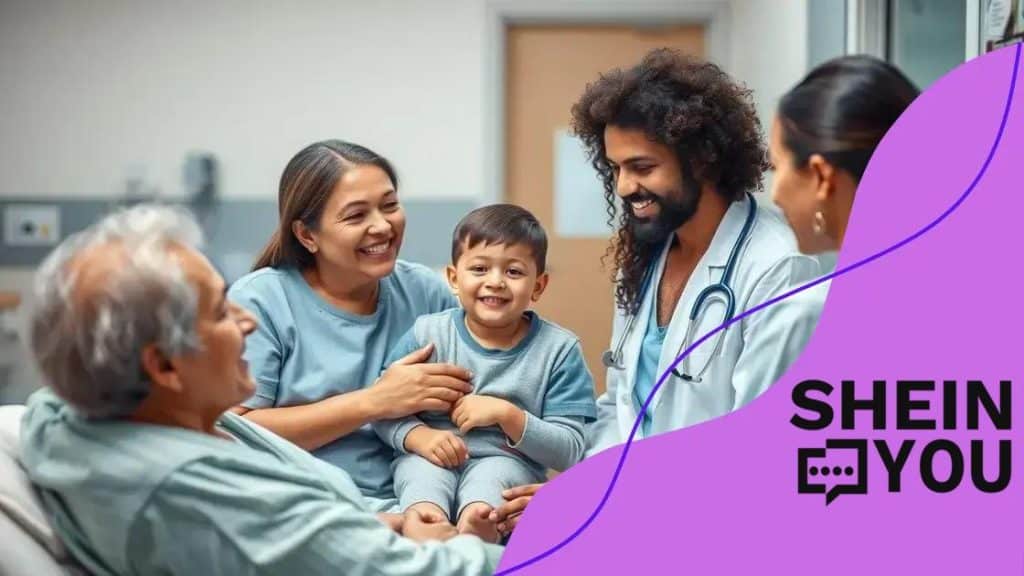Programs offering free healthcare to eligible families

Anúncios
Programs offering free healthcare to eligible families provide essential health services, financial relief, and access to comprehensive care, but families face challenges like complex eligibility requirements and limited awareness of available resources.
Programs offering free healthcare to eligible families are lifelines for many struggling to afford medical care. Have you ever wondered how these programs can significantly ease your financial burden? Let’s dive into the details.
Anúncios
Understanding the eligibility criteria
Understanding the eligibility criteria for free healthcare programs is essential for families seeking assistance. Different programs can have varying requirements, but most focus on income, family size, and residency.
Common Eligibility Requirements
Typically, applicants must provide information about their household income and number of members in their family. It’s important to gather all necessary documents before applying.
- Proof of income such as pay stubs or tax returns
- Identification for all family members
- Proof of residency in the state or area
Additionally, some programs prioritize certain groups, such as children, pregnant women, or seniors. Depending on the program, your household size directly influences the eligibility.
Anúncios
In many cases, healthcare programs also require you to submit your application during specific enrollment periods. Missing these deadlines may prevent you from accessing the services you need.
Special Considerations
It’s crucial to understand that eligibility can vary by state. Some states have broader definitions of who qualifies for free healthcare than others. For instance, Medicaid expansion has provided additional coverage in several states.
If you’re unsure about your eligibility, reaching out to local health departments or community organizations can help clarify your options. They often have resources and staff available to guide you through the process.
Types of free healthcare programs available

There are various types of free healthcare programs available that cater to different needs. These programs serve families, children, the elderly, and low-income individuals. Knowing the types can help you access the right services.
Medicaid
Medicaid is a government program that provides health coverage for eligible individuals and families. This includes a wide range of services, from hospital visits to preventive care. Each state manages its own Medicaid program, so benefits can differ.
Children’s Health Insurance Program (CHIP)
The Children’s Health Insurance Program (CHIP) targets families with children who earn too much for Medicaid but need help with health coverage. CHIP provides affordable coverage for immunizations, check-ups, and dental care.
- Typically covers children and teens up to age 19
- Low-cost or no-cost premiums
- Variety of covered services, including vision and dental
Another type of program includes community health clinics. These clinics aim to provide care for individuals regardless of their ability to pay. They often offer primary care, dental services, and mental health services in a local setting.
Community Health Centers
Community Health Centers are vital resources for people living in underserved areas. They focus on offering comprehensive care to those who might otherwise not have access. Many services provided are on a sliding fee scale based on income.
Additionally, some non-profit organizations and charities offer free or low-cost health services. Programs run by these organizations can focus on specific health issues or populations, such as women’s health or mental health.
Understanding these types of healthcare programs can empower families to seek the care they need. Each program serves a different purpose, but all are essential in improving health outcomes for eligible individuals.
How to apply for these healthcare programs
Applying for healthcare programs can feel overwhelming, but understanding the process can make it easier. Start by identifying which program suits your needs the best. Each program has a specific application process. Knowing what materials you’ll need will help you.
Gather Necessary Documents
Before you apply, collect several important documents. These typically include proof of income, identification, and residency information.
- Recent pay stubs or tax returns to show your income
- Government-issued ID for all family members
- Utility bills or lease agreements to prove residency
Next, look up the application method for the program you’re interested in. Many options allow you to apply online, while others may require you to apply in person at designated locations.
Filling Out the Application
When filling out the application, be honest and thorough. Make sure to double-check all the information you provide. Incomplete or incorrect applications can delay the process or even result in denial.
Some programs offer assistance with completing applications. You can often find support through local community organizations or non-profit groups. They may provide guidance on the information needed and help you submit your application.
Follow Up
After submission, it is crucial to follow up on your application. Some programs may require additional information or documents after the initial application. Keeping track of your application status can ensure you don’t miss any deadlines.
Be prepared to receive a decision, which may take several weeks. If approved, you will receive information on how to utilize your benefits and any next steps.
Expected benefits for families

Understanding the expected benefits for families enrolled in free healthcare programs is crucial. These programs can significantly reduce financial burdens related to medical expenses. Families can access essential services that promote health and well-being.
Comprehensive Health Coverage
Many programs provide comprehensive health coverage including preventive care, emergency services, and specialized treatments. Families can benefit from regular check-ups and screenings, which can catch health issues earlier.
- Preventive services to avoid serious health issues
- Access to emergency care without financial strain
- Specialist services when additional care is needed
Moreover, these programs often include coverage for mental health services, which is vital for overall family wellness. Families facing emotional challenges or mental health issues can access therapy and counseling without additional costs.
Financial Relief
The financial relief provided by these programs can free up family resources for other needs. By ensuring healthcare costs are manageable, families can allocate funds toward education, housing, or savings. This financial flexibility can improve the quality of life.
In addition, many programs also offer resources for dental and vision care. Accessing these services can prevent more severe health issues in the future.
Support Resources
Joining free healthcare programs often grants families access to a network of support resources. These can include nutrition programs, health education workshops, and assistance with scheduling appointments.
Being enrolled in a healthcare program can also connect families to advocacy groups that help navigate the healthcare system. This support can improve their overall health outcomes.
Challenges in accessing free healthcare services
Families seeking to access free healthcare services often face various challenges. These barriers can prevent them from receiving the care they need, even if programs are available.
Understanding Complex Eligibility Requirements
One of the main challenges is navigating the complex eligibility requirements. Each program has its own set of rules, and understanding what is required can be confusing. Families might miss out on benefits simply because they do not know the criteria.
Limited Awareness of Available Programs
Many families are unaware of the programs offered in their communities. This lack of knowledge can result in eligible individuals not applying for necessary services. Awareness campaigns can help, but many still struggle to find information.
Application Process Difficulties
The application process itself can be daunting. Some families may not have access to computers or the internet, making online applications difficult. Others may feel overwhelmed by the paperwork required.
- Need for personal identification and documentation
- Complicated forms that can lead to confusion
- Language barriers for non-English speakers
Furthermore, long wait times for appointments can add another layer of stress. Families may find themselves waiting weeks or even months to receive care, which can worsen health issues.
Geographic Barriers
Geography plays a significant role in access to free healthcare services. In rural areas, there may be fewer resources available. Families might have to travel long distances to reach clinics or hospitals that offer free services.
This travel can be costly and time-consuming, making it more challenging for families to seek out health care. Transportation options can be limited, especially for those without a reliable vehicle.
Addressing these challenges requires support from community organizations, healthcare providers, and local governments. They must work together to improve access and make free healthcare services easier for families to obtain.
Accessing free healthcare services is vital for many families, but it comes with challenges. Understanding eligibility criteria and knowing how to apply is crucial. Families can benefit greatly from these programs, enjoying comprehensive health coverage and financial relief. However, barriers like complex processes and limited resources can hinder access. Community support and resource sharing can help families navigate these challenges and secure the healthcare they deserve.
FAQ – Frequently Asked Questions about Accessing Free Healthcare Services
What are the eligibility requirements for free healthcare programs?
Eligibility requirements vary by program but generally include income level, family size, and residency status.
How can I find out about available healthcare programs?
You can learn about available programs through local health departments, community organizations, or by visiting official government websites.
What challenges might families face when applying for healthcare services?
Families may encounter challenges such as complex application processes, lack of awareness, and geographical barriers to accessing facilities.
What benefits can families expect from enrolling in free healthcare programs?
Families can expect comprehensive health coverage, financial relief from medical costs, and access to various health resources and support services.





